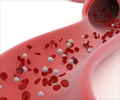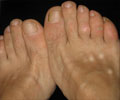Mutations in the calcium sensing receptor gene (CaSR) might be associated with high calcium levels leading to aggressive breast cancer disease in some women.
- High serum calcium has been found to be associated with aggressive breast cancer in premenopausal women and larger tumors in postmenopausal women.
- Current study suggests possible association between mutations in the calcium sensing receptor (CaSR) gene and high serum calcium levels in a set of breast cancer patients.
Earlier studies have shown that breast cancer tends to be more aggressive in premenopausal women and women of African descent.
The reasons for the high serum calcium levels and associated poor outcome in breast cancer remain unclear and the current study aimed to determine whether alterations in the CaSR gene leading to a reduced calcium sensitivity could contribute to the CIH in these women.
Details of The Study
This was a retrospective case-control study that studied 199 breast cancer and 384 age matched controls. Parameters assessed included mean circulating calcium levels and the distribution of two inactivating calcium sensing receptor (CaSR) mutations to determine whether these SNPs are associated with circulating calcium in control subjects and BC cases.
Findings of The Study
- Mean serum calcium levels were significantly higher in breast cancer patients than controls.
- Among the control group, serum calcium levels were significantly more in African American women compared to Caucasian women.
- However in the breast cancer group, circulating calcium levels did not differ markedly between African American and Caucasian women, suggesting that CIH is not dependent on race.
- Mean circulating calcium levels were significantly higher in all subjects (cases and controls) who expressed the variant of the CASR gene at the rs1801725 SNP, but NOT with variants of the CaSR at the rs1801726 SNP (another allele).
- Another notable observation was high calcium levels in African women was not associated with either of the CaSR polymorphisms. But Caucasian women expressing the variant of the CASR gene at the rs1801725 SNP showed significantly higher serum calcium levels.
- In breast cancer patients, inactivating mutations of the CASR gene at the rs1801725 SNP were significantly associated with circulating calcium while no such association was noted with inactivating mutations at the rs1801726 SNP.
Cancer induced hypercalcemia is often seen in advanced breast cancer and in patients with bony metastasis. Increases in serum calcium are not detected or are very mild with no clinical significance. However, these mild increases may promote disease progression and spread by activating CaSR mutations or other calcium dependent cancer pathways.
Takeaways From The Study
- The study team believes that the hypercalcemia seen in breast cancer may be due to a combination of CaSR inactivating mutations and tumor cell derived osteolytic (dissolve bone) factors.
- Higher baseline calcium levels found in women of African descent may contribute to the more aggressive disease seen in these women.
- The high serum calcium levels in breast cancer women of African descent were not found to be related to CaSR mutations during this study. The team believes that other mechanisms may be at play causing hypercalcemia in African women with breast cancer, which however could not be satisfactorily evaluated in this study due to lack of sufficient data.
Based on this study, future research could focus on the following factors to gain better insight and clarity in the processes underlying breast cancer.
- Studying the role of elevated calcium levels in larger multi-center studies
- The role of CaSR gene mutations in influencing the prognosis in breast carcinoma women
- Modifying the function of the CaSR by pharmacological inhibition of its activity e.g. using calcilytic agents has been found to decrease cancer proliferation and spread. Newer treatment options focusing on this pathway may be explored in breast cancer women having hypercalcemia.
- Li Wang, Sarrah E. Widatalla, Diva S. Whalen, Josiah Ochieng and Amos M. Sakwe. Association of calcium sensing receptor polymorphisms at rs1801725 with circulating calcium in breast cancer patients. BMC Cancer DOI: https://doi.org/10.1186/s12885-017-3502-3
















